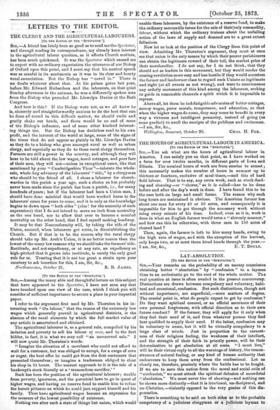LETTERS TO THE EDITOR.
THE CLERGY AND THE AGRICULTURAL LABOURERS. [TO THE EDITOR OF THE "SPECTATOR."] Stn,—A friend has lately been so good as to send me the Spectator, and through reading its correspondence, my already keen interest in the agricultural labour question, as it affects Church matters, has been much quickened. It was the Spectator which caused me to expect with no ordinary expectation the utterance of our Bishop of Oxford upon this point, and I,must say that his neutral speech was as manful in its sentiments as it was in its clear and hearty vocal enunciation. But the Bishop has " caved in." There is no doubt whatever about that. At his palace gates last year, before Mr. Edward Richardson and the labourers, on that quiet Sunday afternoon in the autumn, he was a differently spoken man from the Bishop who preceded Mr. Llewelyn Davies at the Bath Congress.
And how is this? If the Bishop were not, as we all know he is, sincerely and straightforwardly anxious to do the best that can be done all round in this difficult matter, we should smile and gently shake our heads, and there would be an end of some of the Bishop's influence, and of some other kindred interest- ing things too. But the Bishop has doubtless read to his own profit, and the interest of the world at large, some of the signs of the times that do not appear so plainly to Mr. Llewelyn Davies as they do to a bishop who goes amongst rural as well as urban clergy, and especially as they do to those rural clergy themselves. Farmers are still a power in the country, and although they will bear to be told about the low wages, hovel cottages, and poor fare of their men, they will not—unless in exceptional cases, like that mentioned by your " Cambridgeshire Vicar "—tolerate the whole- sale, whole-hog advocacy of the labourers' "side," by a clergyman who should be the friend of all. I chose a labourer for church. warden in this parish a year ago, such a choice as has probably never been made since the parish has been a parish, i.e., for many hundreds of years; but if the labourer had been a Union man, I should have done mischief that would have worked harm to the labourers' cause for years to come, and it is only as the knowledge begins to dawn upon " both sides " (alas ! for the necessity of such expressions) that I do not intend to move an inch from neutrality on the one hand, nor to allow that ever to become a muzzled neutrality on the other hand, that I find myself making headway.
It may be that Nonconformity will, by taking the side of the Union, succeed, when labourers get votes, in disestablishing the Church. But if that is to be the reason why the rural clergy should take up Mr. Arch's Union, it is no better reason than the lowest of the many low reasons why we should take the farmers' aide. Rectitude, and not expediency, or at any rate, an expediency so high-pitched that it grows into rectitude, is surely the only good rule for us. Trusting that it is not too great a strain upon your courtesy to ask insertion for this, I am, Sir, &c.,






































 Previous page
Previous page